Event overview
Organised in partnership with Strathmore University and Jaza Rift, the 25th Frontiers event took place from 5 to 7 February 2025 at Strathmore University in Nairobi, Kenya. Chaired by Professor Alicia El Haj FREng, and Dr Julius Butime, the symposium brought together participants from diverse disciplines across 25 countries, providing a platform for leading experts in healthcare, technology, policy, and investment to highlight the importance of interdisciplinary collaboration, the need to scale healthcare innovations and the urgency of addressing global challenges such as pandemics and healthcare accessibility.
In her opening remarks, Professor El Haj underscored the vital role of interdisciplinary collaboration in advancing healthcare innovations, highlighting how combining different perspectives leads to more effective problem-solving. “While personal ambition is valuable, collective progress will happen faster when individuals work together as a team,” she said.
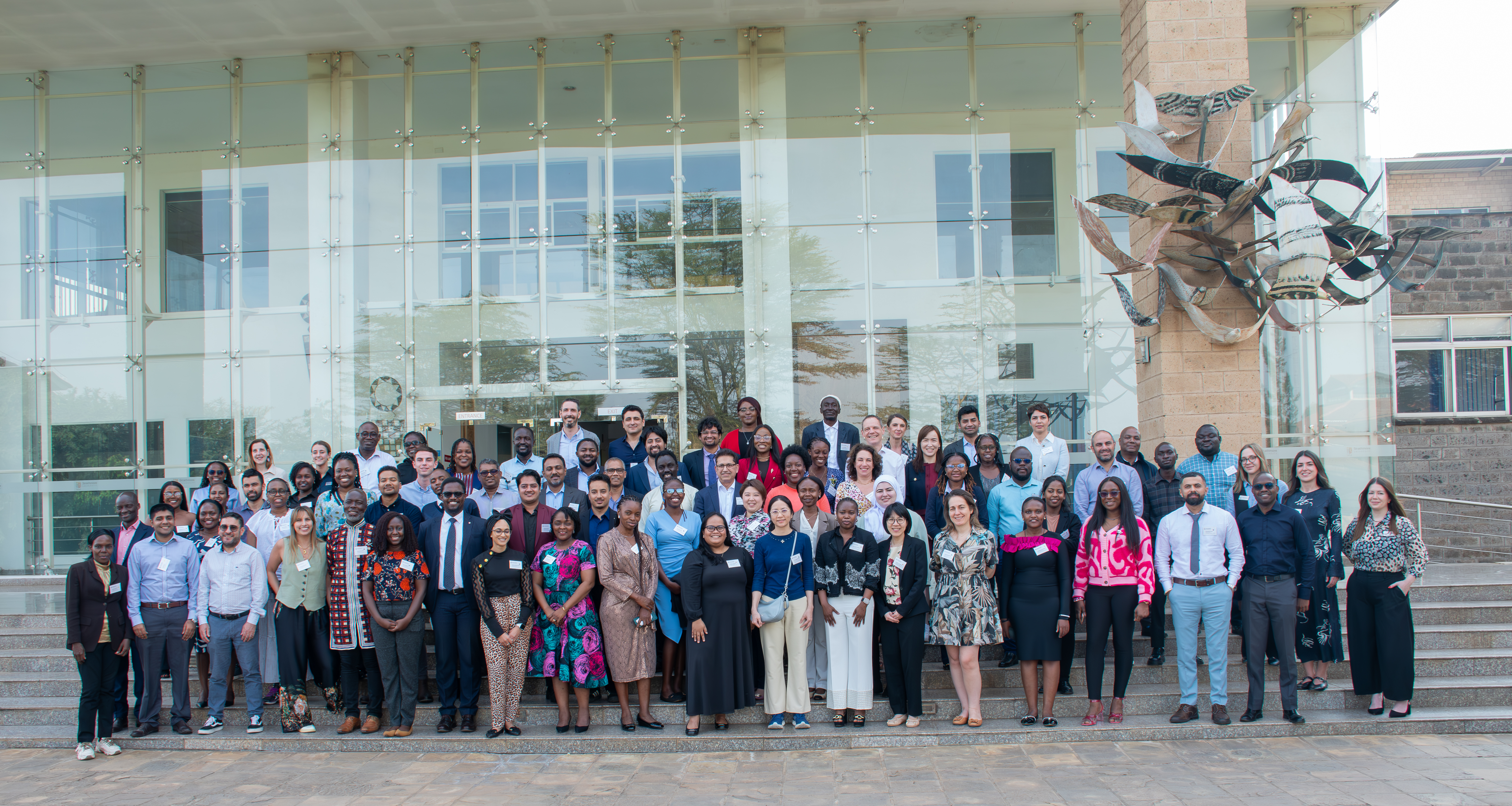
While personal ambition is valuable, collective progress will happen faster when individuals work together as a team.
Professor Alicia El Haj FREng
Discussion themes
Throughout the symposium, discussions centred around three key sub-themes:
- Scaling innovation and strategies for a diverse healthcare landscape
- Innovative funding models for healthcare scale-up
- Collaborative ecosystems: partnerships for healthcare
Event chairs

Professor Alicia El Haj FREng
University of Birmingham
Professor El Haj is an academic innovator translating novel cell-based therapies to the clinic. She is the founder of a spin out company MICA Biosystems Ltd involved in translating innovative regenerative therapies. Professor El Haj was awarded a Royal Society Merit Award and is a Fellow of the Academy. She was awarded the Midlands Women in Tech Award, the IOM3 Chapman medal for major contribution towards translation of biomedical materials into healthcare and the TERMIS Career Achievement Award for discovery and translation of regenerative medicine into the clinic.
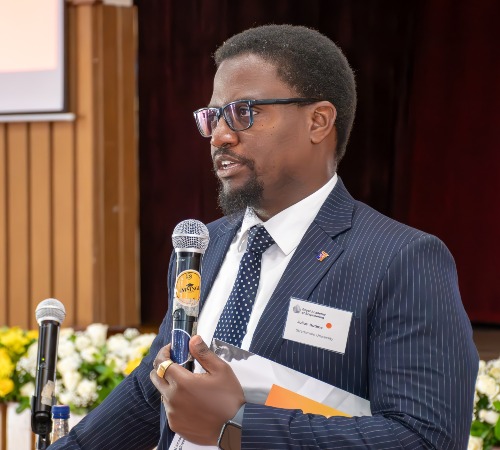
Eng. Dr Julius Butime
Strathmore University
Eng. Dr Butime is an electrical engineer with over 16 years’ experience in engineering education focusing on areas such as spectrum management, computer vision, wireless communication, and curriculum development. Dr Butime has been engaged in research in engineering training, data protection policy development, renewable energy business incubation and implementation of the SDGs in engineering practice. Dr Butime is interested in fostering partnerships across the public, private and NGO sectors in international engineering practice and training.
Sessions and speakers
Scaling innovation and strategies for a diverse healthcare landscape
Healthcare innovations, particularly AI, have the potential to revolutionise patient care and efficiency. However, challenges like scalability, sustainability, and ethical concerns must be addressed. Additionally, treating traumatic bone injuries in conflict zones underscores the need for affordable, locally produced solutions to improve care in resource-limited settings. Solutions discussed included leveraging tech-driven innovations like drones for medical supply delivery, prioritising local capacity-building, and implementing AI-enabled tools for mental health services.
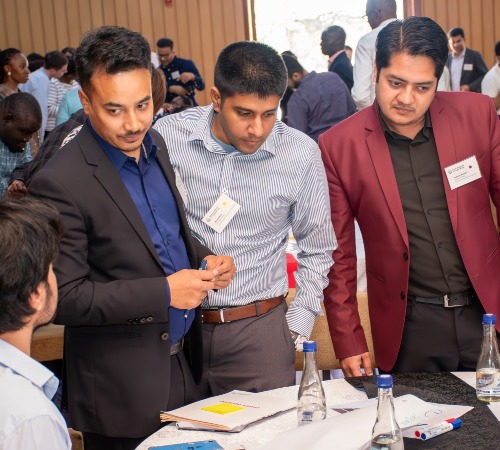
Key takeaways
- For AI to be a catalyst for innovation, equity, and ethical integrity, strong regulatory frameworks must guide its implementation, rigorous evaluation, and validation of AI applications in healthcare. Clear guidelines must also be established to ensure ethical AI deployment.
- Injuries in conflict zones are complex and require specialised treatment, including external fixators and bone grafts. There is, therefore, an urgent need for affordable, effective, and locally produced bone repair solutions in these settings.
- Regulatory harmonisation is key for creating a unified innovation framework , alongside talent development through the creation of healthcare education hubs, leveraging public-private partnerships to invest in infrastructure.
- Cultural integration should be considered to ensure innovations are effectively adapted to local contexts.
Presentations
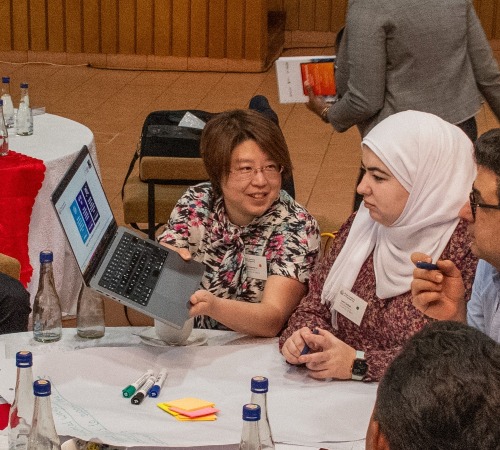
AI and healthcare innovations: challenges and opportunities
Dr Huiqi Yvonne Lu
Dr Huiqi Yvonne Lu’s presentation emphasised AI’s potential to revolutionise patient care and healthcare efficiency, including:
- Patient monitoring – using AI-driven technologies for continuous tracking of patient vitals.
- Physiological and psychological modelling – AI’s role in predicting health conditions based on patient data.
- Robotics in healthcare – enhancing surgical precision and automating routine medical tasks.
Further, she discussed global challenges in implementing AI-driven healthcare solutions, particularly in Africa, the Americas, and Southeast Asia, which include:
- Scalability – difficulty in expanding AI technologies across different healthcare infrastructures.
- Sustainability – ensuring AI systems remain cost-effective and operational in the long term.
- Safety and trust – addressing ethical concerns and mitigating risks related to AI decision-making in healthcare settings.
To overcome these barriers, Dr Lu proposed developing adaptable and robust AI technologies that can be integrated into diverse healthcare ecosystems while ensuring equitable access.
She emphasised the importance of AI governance, referencing international regulatory frameworks such as the World Health Organization (WHO) and International Organization for Standardization (ISO) to ensure AI reliability and safety. She underscored the need for stringent evaluation and validation processes to maintain AI’s trustworthiness and accountability in medical settings.
In her concluding remarks, Dr Lu emphasised the necessity of aligning AI innovation with sustainable development goals (SDGs) to ensure healthcare advancements are equitable and accessible worldwide. She envisions AI as a catalyst for innovation, equity, and ethical integrity, empowering countries to implement AI-driven healthcare solutions in a sustainable and impactful way.
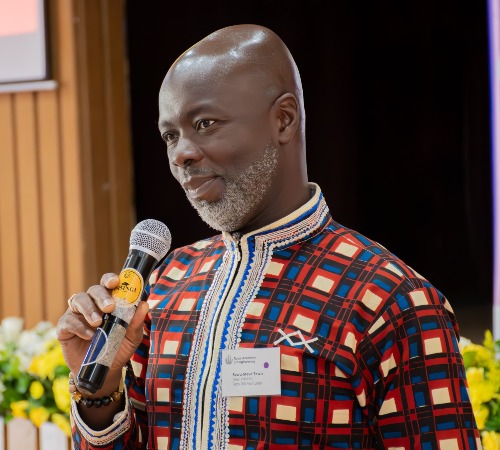
Scaling healthcare innovations in Africa: the GrowthPod opportunity
Sewu-Steve Tawia
Sewu-Steve Tawia explored how healthcare innovations in Africa can scale effectively through the GrowthPod initiative. He highlighted the challenges posed by Africa’s diverse healthcare landscape, where, with fifty-four countries, each have distinct regulatory, corporate, and tax frameworks. Unlike the more uniform healthcare systems in the US, Europe or China, African healthcare scale-ups face unique barriers that slow growth and expansion. These include regulatory complexity, talent shortage, fragmented markets, and infrastructure gaps. Others include economic and political instability, cross border payment challenges and cultural and social barriers.
To address these challenges, Tawia emphasised the need for a collaborative approach that brings together local governments, the private sector and international organisations. GrowthPod provides practical support for scaling healthcare innovations, including:
- Local landing offices – helping companies establish a presence in multiple African markets.
- Market access support – connecting businesses with potential customers and stakeholders.
- Regulatory advisory services – guiding businesses through complex legal and compliance requirements.
- Mentorship and support networks – offering expertise and strategic advice to scale effectively.
- Funding access – facilitating investment opportunities for healthcare innovators.
Lastly, he highlighted the importance of events such as the Frontiers symposium in fostering partnerships and driving progress in Africa’s healthcare sector., and how collective efforts can enhance healthcare scalability.
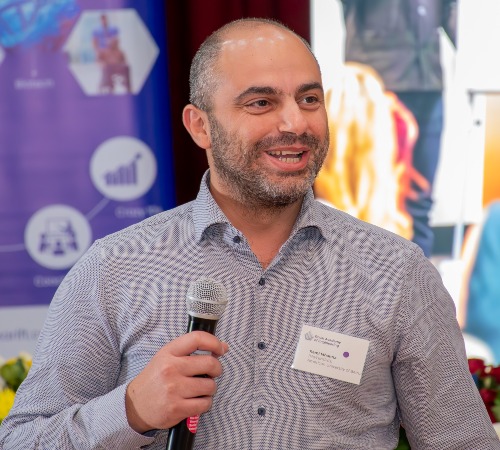
Management of traumatic bone injuries in conflict settings
Dr Rami Mhanna
Dr Rami Mhanna’s presentation on the challenges of managing traumatic bone injuries in conflict zones highlighted the widespread occurrence of such injuries, resource limitations in war-affected areas, and the complexities of providing effective treatment. The lack of timely trauma care often leads to severe infections and preventable fatalities, further exacerbating the crisis.
Traumatic bone injuries often require specialised interventions, including external fixators and bone grafts. In cases of critical-sized bone defects, surgical procedures are necessary, with autologous bone grafts — using the patient’s own bone — being the preferred method. However, the availability of donor tissue is limited, prompting researchers to explore synthetic alternatives such as calcium phosphates and bioactive glasses.
To address these challenges, Mhanna discussed emerging technologies that incorporate hydrogels with bioactive scaffolds to promote bone healing. While these scaffolds show promise in stimulating bone regeneration, they face significant challenges, particularly in encouraging vascularisation, which is crucial for healing larger bone defects.
In addition to these biological and medical challenges, conflict zones suffer from systemic issues such as the need for decentralised and portable treatment solutions, the production of medical materials locally, and a shortage of trained professionals. Delays in the approval of new medical solutions further complicate the situation, making it even more difficult to provide timely and effective treatment.
His presentation underscored the urgent need for affordable, efficient, and locally produced bone repair solutions in war-affected areas.
Innovative funding models for healthcare scale-up
How much time should innovators spend seeking grants and funding? Is relying on grants a sustainable model for scaling businesses? For start-ups in low- to middle-income economies, how can they balance the need for a sustainable business model with the financial stability required to keep operations running? One key strategy is to align innovations with government priorities, as the government is often the largest client for healthcare innovations. Pursuing active collaboration with public entities can bring innovations closer to adoption and ensure the long-term sustainability of the business.
Presentations
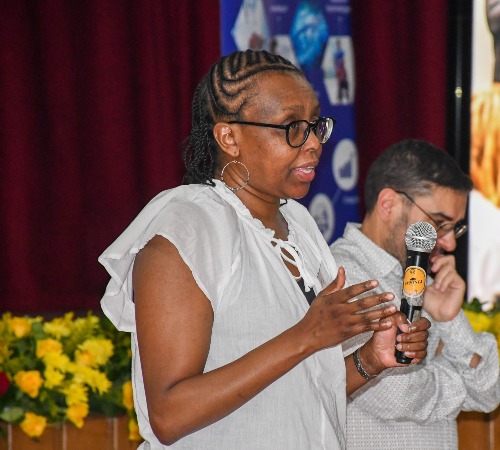
Why is so much start-up funding going after such a small set of the same projects?
Dr Watu Wamae
During her presentation, Dr Wamae addressed the critical challenges of funding healthcare innovation, particularly for early-stage ventures. She spoke of a significant funding gap, pointing out that 99% of available funding is directed toward later-stage ventures, leaving early-stage innovations vulnerable to failure — a phenomenon often referred to as the Valley of Death.
Traditional funding models overwhelmingly favoured established ventures while neglecting the crucial need for early-stage capital. This, she explained, creates a systemic barrier that prevents promising healthcare solutions from advancing beyond the conceptual phase. She also identified what she termed as “Grantpreneur syndrome”, where startups become overly dependent on grants rather than focusing on developing sustainable, scalable business models. This reliance on grant funding, while providing short-term financial relief, can ultimately hinder a company’s ability to attract long-term investment and achieve widespread impact.
To address these challenges, Dr Wamae advocated for “patient capital”, a form of impact-driven investment that prioritises long-term healthcare improvements over immediate financial returns. She called for a shift toward blended finance models, impact investing, and public-private partnerships as viable solutions for supporting early-stage healthcare innovations.
In addition, she emphasised the critical role of data infrastructure, AI, and digital technologies in enhancing the viability and scalability of healthcare investments. By leveraging these tools, innovators can strengthen their investment readiness, improve healthcare delivery efficiency, and increase accessibility to underserved populations.
There is an urgent need to rethink funding approaches in healthcare innovation, ensuring that promising early-stage solutions receive the necessary support to scale and achieve sustainable, long-term impact.
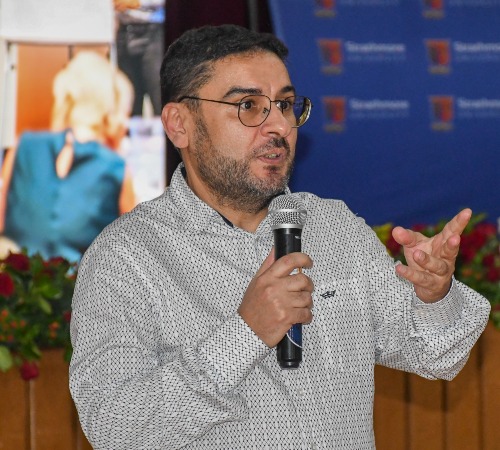
Sustainable healthcare innovation and investment readiness: from the perspective of Philips Foundation
Dr Bahaa Eddine Sarroukh
Dr Sarroukh focused on sustainable healthcare investment, emphasising end-user needs in low and middle-income markets. He introduced the Philips Foundation Impact Investments, which supports healthcare ventures through long term funding and partnerships to strengthen local ecosystems.
He gave three examples of successful projects they had funded, including Access Afya, a digital healthcare platform that improved affordability of healthcare services, iMedrix, a mobile, cloud connected device which enables real-time cardiac monitoring in remote areas, and Healthy Entrepreneurs, which trains community health workers to deliver medical services.
A key component of the presentation was the introduction of a multi-level maturity model designed to assess the scalability of healthcare ventures. This framework evaluates crucial aspects such as team capabilities, value proposition, market validation, and exit strategies, ensuring that ventures are well-positioned for sustainable growth.
He stressed the role of blended financing, technology-driven solutions, and strong regulatory frameworks in ensuring sustainable healthcare innovation. His presentation highlighted the need for an integrated approach that combines funding, innovation, and policy to drive impact in underserved regions.
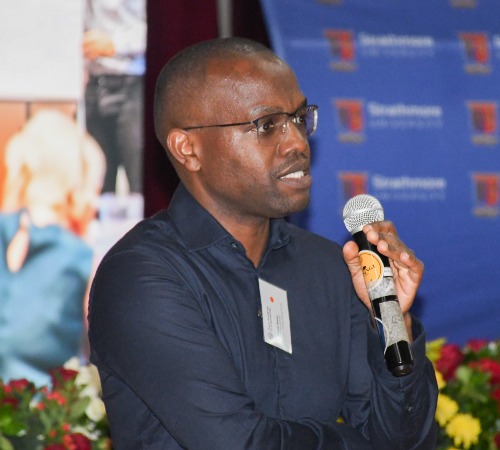
Scaling innovations in the public sector
Dr Josea Rono
Dr Rono started the presentation by emphasising that scaling healthcare innovations in the public sector requires a demand-driven approach, ensuring alignment with government priorities and healthcare system needs. He encouraged participants to shift their approach by first engaging stakeholders — particularly government bodies — to understand pressing challenges, spending priorities, and critical healthcare gaps before developing solutions.
He introduced the Million Lives Collective (MLC), a global initiative dedicated to scaling proven healthcare innovations. MLC supports innovators by highlighting impactful solutions, connecting them with investors and collaborators, and sharing key insights on the scaling process.
He highlighted the public sector scaling checklist tool. This structured framework helps innovators navigate public sector adoption by identifying government demands, aligning solutions with public priorities, addressing regulatory and policy requirements, and securing funding and policy support for seamless healthcare integration. Public-private partnerships are important in achieving large-scale healthcare innovation.
Three essential factors for public sector investment readiness include:
- Government co-creation and ownership – engaging policymakers early to enhance adoption and long-term sustainability.
- Regulatory compliance – ensuring legal and policy adherence to build trust and credibility.
- A clear go-to-market strategy – developing well-defined implementation pathways for widespread adoption.
Collaborative ecosystems: partnerships for catalysing healthcare
Each sector in the innovation chain brings unique strengths essential for progress. Academia fosters research and discovery, industry drives commercialisation, NGOs ensure accessibility and equity, and governments provide regulatory support and funding. Collaboration among these sectors enhances their complementarity. Ultimately, healthcare innovation is not just about developing new technologies but also understanding the economic, technological, and social factors that influence adoption and sustainability. Ignoring the interconnectedness required to advance innovations can result in event the the most ground-breaking innovation solutions struggling to make a lasting impact
Key takeaways:
- Successful healthcare innovation requires understanding economic, technological, and social influences.
- Academia, industry, NGOs and government must unite for sustainable healthcare solutions. Success in healthcare innovation depends on partnerships across sectors.
- The gap in medtech innovation coupled with weak local manufacturing systems in Africa has led to over-reliance on outdated imported technology.
- Cultural differences significantly impact product viability and should be carefully considered. Value can come from improving existing products: start small, then scale.
- Understanding unit economics and profitability early is crucial for long-term sustainability.
Presentations
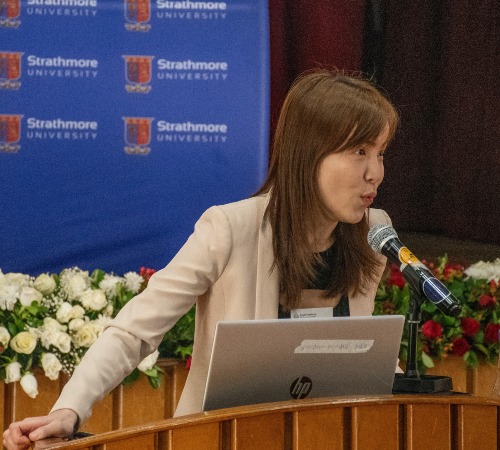
Innovating global healthcare: through technology and collaboration
Dr. Evona Teh
Dr Teh shared a personal story about choosing between scholarships in medicine and engineering. Initially drawn to medicine for its impact, she followed her mother’s advice to pursue engineering, leading to a career that merges technology and healthcare.
As founder of EV Medical Consulting and a visiting professor at Imperial College London, she stressed the importance of multidisciplinary approaches in healthcare. She focuses on identifying inefficiencies in patient care and implementing quality improvement frameworks such as the UK National Health Service’s (NHS) Quality and Outcomes Framework, which can be adapted for different cultural contexts, such as Malaysia.
Dr Teh discussed global healthcare trends, including demographic divides that could worsen inequalities. She highlighted cultural differences in response to AI – western caution vs. eastern trust – and emerging innovations such as human augmentation and brain-computer interfaces to enhance cognitive functions. She also underscored 6G’s potential to revolutionise healthcare through real-time data sharing and enhanced connectivity.
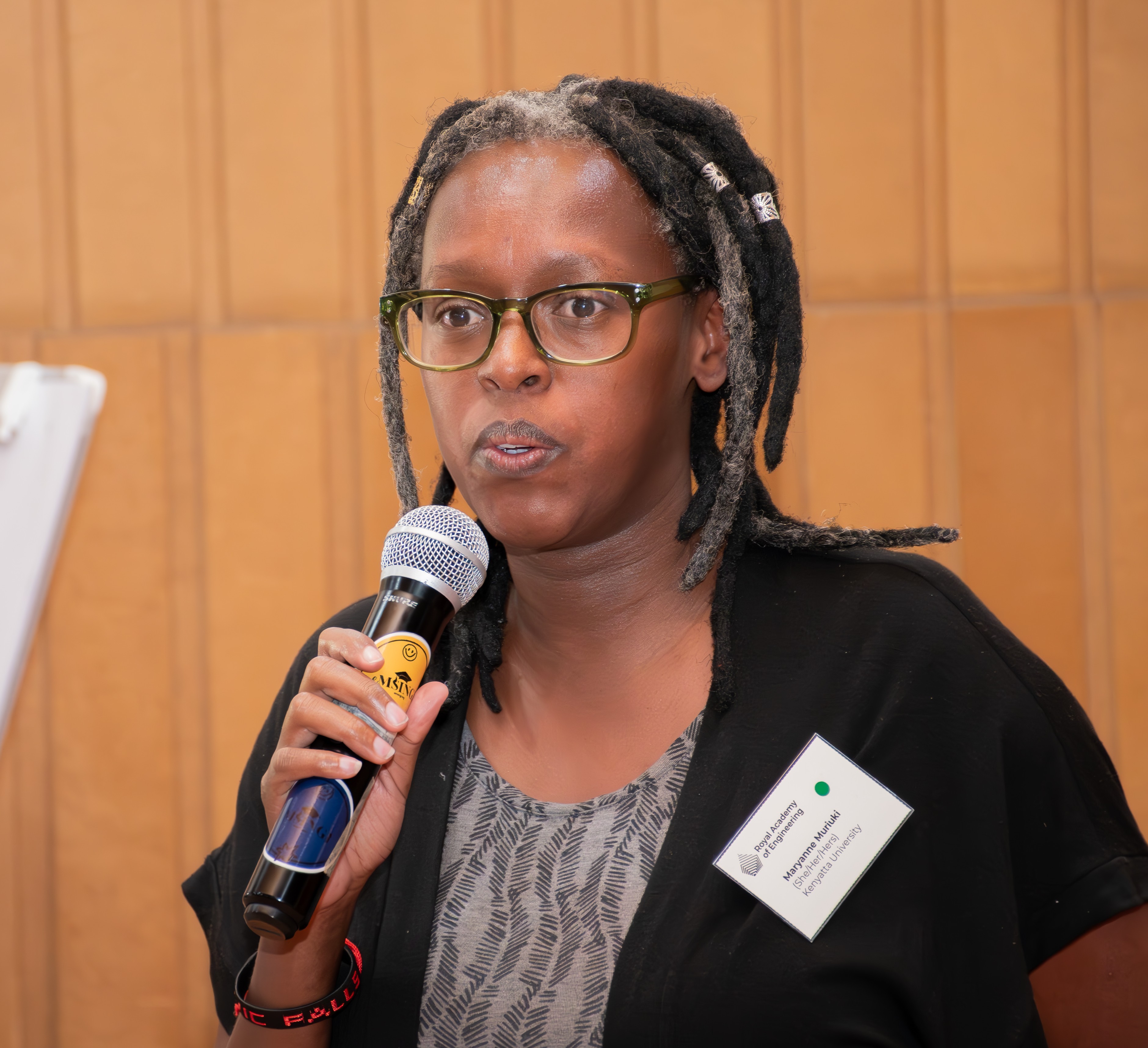
Reflections on African medtech innovation and commercialisation
Wambui Gachiengo Nyabero
Wambui Nyabero’s presentation provided a comprehensive analysis of the challenges and opportunities in Africa’s medtech sector, drawing from her interaction with officials at a faith-based hospital in Kenya. She highlighted a critical issue: the lack of functional and adequate medical equipment. Many hospitals rely on outdated, imported, or donated equipment — often over 15 years old — which is difficult to maintain due to a shortage of trained local technicians and a reliance on costly external repairs. Over 90% of Kenya’s medical technology is imported, with limited after-sales support, creating what she termed “equipment graveyards”.
The high costs and fragmented market make it difficult for healthcare providers to sustain operations, and the weak local manufacturing ecosystem further limits innovation. She stressed the need for diverse leadership to drive innovation and create more inclusive solutions.
To tackle these challenges, she advocated for:
- A data-driven, user-centric approach to ensure innovations meet real healthcare needs.
- Practical training and technical transfer to bridge skills gaps.
- Harmonised regulatory frameworks across Africa, leveraging pan-African trade agreements.
- Local manufacturing to reduce dependency on imports, citing innovation such as VacciBox from Norah Magero as successful models.
By fostering collaboration, regional integration, and investment in local production, Nyabero believes Africa can develop a more sustainable and efficient medtech industry.
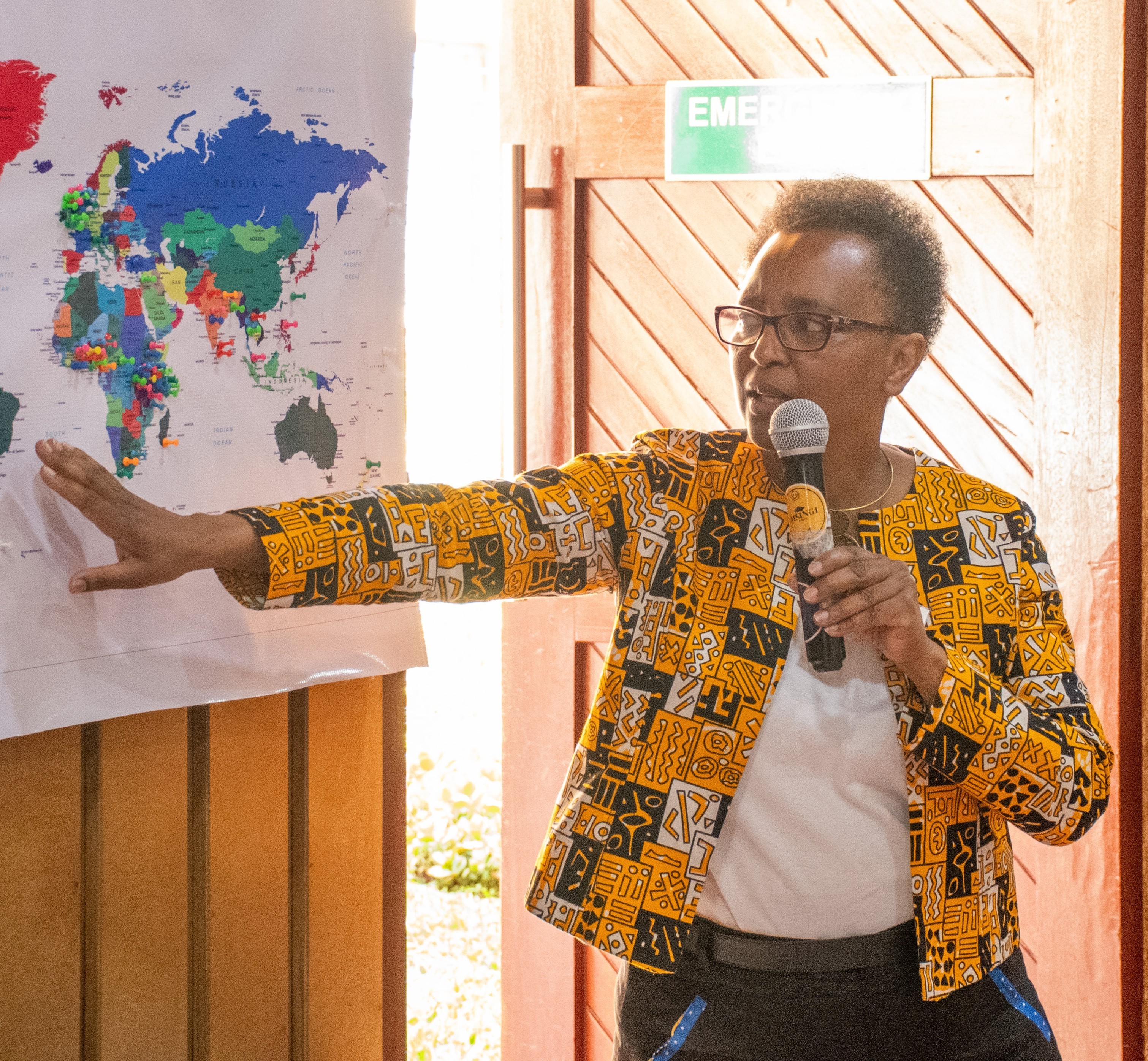
Entrepreneurship in global healthcare: leveraging expertise for scalable impact
Maryanne Muriuki
Maryanne Muriuki shared her entrepreneurial journey, which began in the US with a vision to manufacture in Africa. Together with a team of Kenyans, she launched a polystyrene food packaging business in Kenya, importing a manufacturing line from China.
What initially seemed promising quickly revealed unexpected challenges. Cultural differences, such as Kenyans’ preference for stews over burgers, made their US-inspired packaging design impractical. Additionally, navigating Kenya’s complex regulatory landscape also proved far more challenging than anticipated. Muriuki and her team realised they did not fully understand the demands of setting up a business in Kenya.
From 2014 to 2019, she ran the business until a fire forced its closure. Reflecting on her experience, Muriuki emphasised key entrepreneurial lessons:
- Customer-centric innovation – products must align with local needs.
- Regulatory awareness – understanding government policies is crucial.
- Capital and research – research-backed funding enhances business survival.
- Collaboration – finding the right partners drives scalability.
- Incremental improvement – innovation is not about novelty but about enhancing existing products.
- Sustainable growth – focus on unit economics and profitability rather than conferences or chasing funding.
Maryanne stressed that healthcare innovation, especially in medical devices and systems, requires collaboration between governments, academia, private industries, and nonprofits.
Keynote Speakers
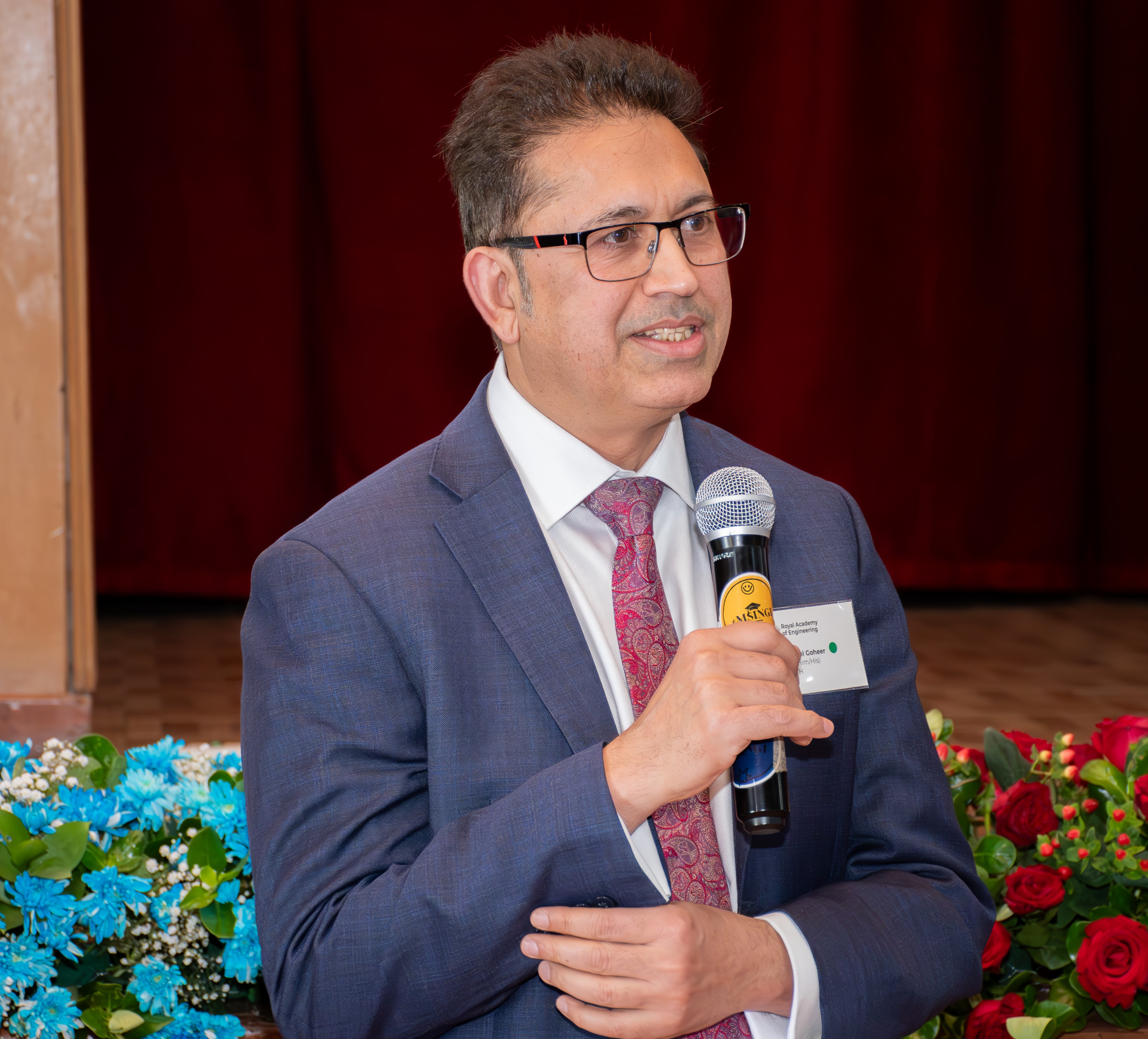
Dr Nabeel Goheer
Chief of the Asia, Middle East and Europe
(AMEE) region, PATH
Dr Goheer’s speech focused on the critical role of research, innovation, and collaboration in advancing global health, structured around four key themes.
He began by highlighting the devastating impact of the COVID-19 pandemic, which resulted in over $16 trillion in economic losses – equivalent to three years of global economic output. The pandemic claimed over 7 million recorded lives, with an estimated 14 million additional unreported deaths – a scale equivalent to the loss of sixteen countries the size of Barbados. However, Dr Goheer noted that innovation played a crucial role in saving millions of lives. “By quickly collaborating and developing testing kits and vaccines, innovators saved us,” he noted, underscoring the power of scientific ingenuity and partnerships. Moving to the broader landscape of global health, Dr Goheer discussed the intricate landscape of global health, outlining major players driving innovation, funding, and research. Philanthropic organisations such as the Gates Foundation, Wellcome Trust, Global Fund, and GAVI play a significant role, alongside multilateral development banks such the World Bank, which provide substantial financial resources. He noted that the global healthcare market is worth nearly $7 trillion, offering significant funding opportunities for innovators. However, he cautioned that funding alone is not enough – understanding market dynamics, regulations, and global health priorities is essential for success. “As an innovator, you must understand the market to know where to pitch your ideas,” he advised.
Dr Goheer then introduced PATH, where he leads operations across Asia, the Middle East, and Europe. He highlighted its significant contributions, including its role in the WHO prequalified malaria vaccine in 2023, developed with support from the Gates Foundation. PATH’s work spans multiple areas from supporting 1,400 innovations and helping commercialise solutions to advancing research, product development, and affordable healthcare technologies. The organisation also integrates climate adaptation into health innovation and leverages AI, data, and digital health to improve diagnostics and accessibility. He encouraged innovators to align their work with global funding sources and regulatory frameworks, engaging with stakeholders early to avoid delays in approvals and scale their impact efficiently.
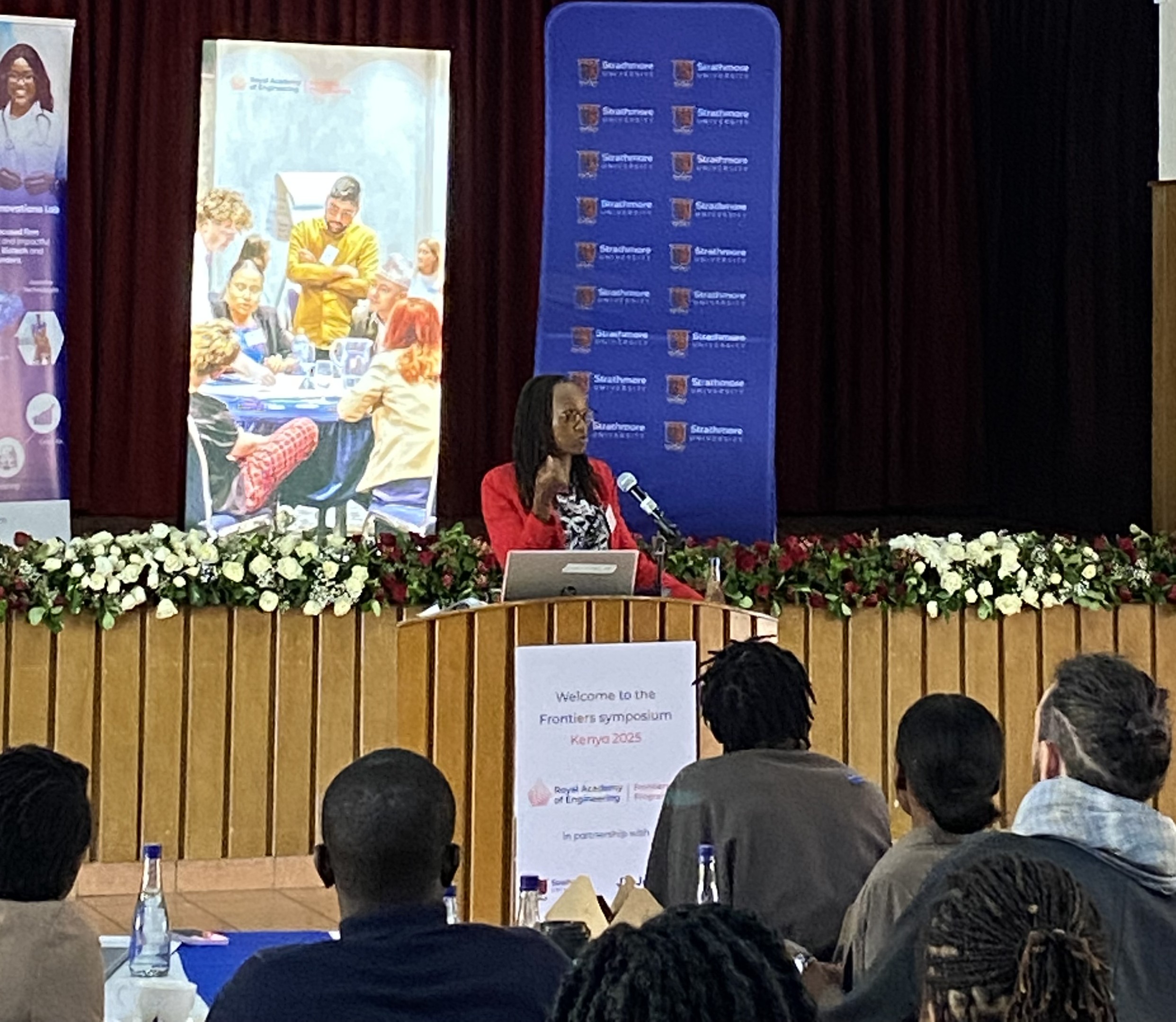
Solving global health challenges requires a tapestry of diverse perspectives. Collaboration is not just beneficial - it is essential
Dr Evelyn Gitau
Chief scientific officer, Science for Africa Foundation
Dr Gitau opened her speech by highlighting global healthcare challenges, including infectious diseases, rising non-communicable diseases, and climate resilience. Despite these, she reiterated that opportunities for healthcare transformation still exist, through innovation, funding and partnerships, noting that COVID-19 demonstrated the power of cross border collaboration.
She then introduced the Science for Africa Foundation (SFA), a pan African non-profit dedicated to strengthening and promoting science and innovation. The foundation’s strategic plan aims to position it as a leader in advancing African science for a better future. Its mission is to enhance Africa’s science and innovation ecosystems to address sustainable development challenges and improve lives.
Dr Gitau highlighted two of the foundation’s most impactful flagship programmes:
1. Grand Challenges Africa (GC Africa) supportsAfrica-led scientific innovations aligned with the Sustainable Development Goals (SDGs). The programme provides seed and scaleup grants for promising solutions. Notable projects that the foundation has supported
through this include:
- Incas diagnostics, which reduced yaws diagnosis time from two weeks to two hours, benefiting over 15,000 people. They also developed HIV and malaria test kits, impacting over a million individuals, and a rapid COVID-19 test.
- Friendship Bench project delivered 349,838 mental health consultations and trained over 2,100 community health workers (“community grandmothers”) to provide localised mental health support.
2. DELTAS Africa strengthens research capacity through a hub-and-spoke model, where a lead institution collaborates with multiple partners across countries to secure grants and implement scientific programs. Key achievements include:
- Strengthening research training and creating career pathways with 2,011 fellows to date, including 738 undergraduates, 388 master’s students, and 335 PhD candidates.
- Fostering equitable research collaboration while engaging policymakers and the public, with 976 collaborations established (both individual and institutional), 258 community engagement activities reaching over 35 million people, and 2,479 research dissemination activities reaching over 104 million people.
Dr Gitau concluded by recalling the need for diverse perspectives in addressing global health challenges. She urged stakeholders including academia, policymakers, the private sector, and communities to collaborate on inclusive and innovative solutions. She encouraged attendees to use the symposium to forge lasting partnerships, break down silos, and drive healthcare innovations forward.
Interested in the next Frontiers symposium?
Find out more about Frontiers.
More Symposia reports
Browse resource libraryAgriculture, big data and the knowledge economy
The event brought together 66 early- to mid-career researchers to share ideas and discuss development challenges arou…
Empowering resilience: integrating innovation, sustainable communities, and climate adaptation strategies
Delegates from different disciplines and 19 countries came together to explore innovative climate adaptation approaches…
Systems approaches in a just energy transition for equitable access
Delegates from different disciplines and 23 countries came together to discuss how systems approaches can support the t…
